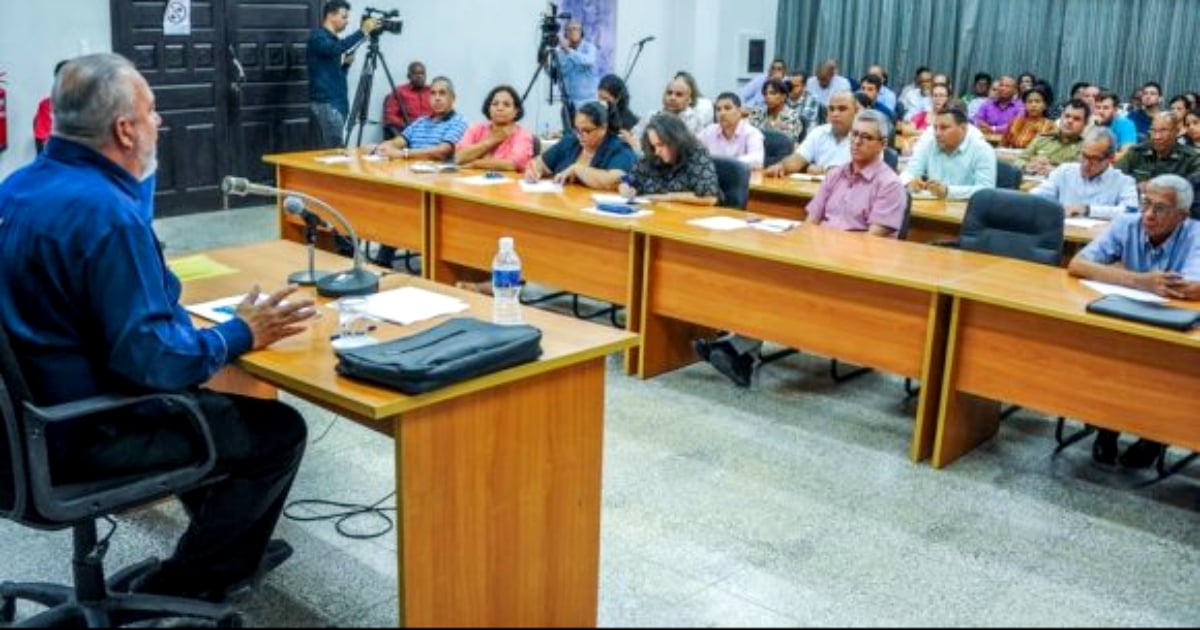
“After the ship is lost, all pilots”: the saying applies to the government of Miguel Díaz-Canel and his ministers who, these days, after having sunk the country with their failed policies, seek to shift the responsibility to local and interchangeable leaders.
It became clear to the executives undergoing training at the Higher School of State and Government Leaders that, this Monday, Prime Minister Manuel Marrero Cruz urged them on the “responsibility of leaders in guiding the implementation process of Government Projections to correct distortions and reinvigorate the economy.”
"When detailing the progress in meeting the eight objectives of this action plan, the prime minister emphasized the need to strengthen the management of the leaders, whose performance always makes a difference. In that regard, he called for raising the level of preparation, as well as the demands, discipline, and control," reported Cubadebate.
According to the state-run media, Marrero Cruz emphasized the importance of information and knowledge for decision-making. Without a hint of embarrassment, he urged the need to value the training of leaders to identify what more can be done in this regard. "Starting by reviewing ourselves," he added.
"Everything learned here must be implemented in each person's area of action, in pursuit of more efficient results," Marrero Cruz urged the so-called "cadres" (leaders of the totalitarian regime).
The Prime Minister's speech could not omit references to the "current war economy scenario," in which "the leadership of the cadres is crucial to overcoming internal deficiencies, dispelling dismotivation, and seeking solutions to problems, in constant interaction with the people."
The application of science and innovation, digital transformation, and social communication—guidelines that, according to Dr. Díaz-Canel, constitute the pillars of his government's management—were also brought up by Marrero Cruz, to whom the Palace has assigned the task of "turning on the fan" and spreading around the waste or responsibilities that the palace leaders do not want to assume.
Marrero Cruz, the "scourge" of low-ranking leaders
Recently, Marrero Cruz called for more "concentration" from Cuban leaders to carry out the "implementation of the approved actions aimed at supporting the Government Projections to correct distortions and revitalize the economy."
This was expressed during the meeting of the Council of Ministers for the month of September, in which the head of the Cuban regime emphasized the "responsibility" of local officials and leaders in the process and the results that the central government expects to obtain from its strategies and "projections."
"In the midst of all this reality... the lack of fuel, the lack of foreign currency, the lack of electric energy... Amid all this, numerous subjective issues coexist that we haven't managed to resolve. We need to focus, in the face of so many objective difficulties, on addressing the subjective problems," said the Prime Minister.
According to the summary of the meeting held by Cubadebate, Marrero Cruz insisted that "the first thing we need to do is focus on solving everything that is within our reach, because there is a lot of sloppiness and there are many issues that do depend on us, and that we are not addressing due to a lack of demand."
"We must tackle subjective problems head-on, each in their own sphere, in the tasks that correspond to and direct them, but also at the community level, where problems are first resolved," he emphasized.
The Cuban regime insists that the indicators of the macroeconomy show "modest progress," but reproaches local actors in its power structure that these supposed advances "have not yet reached the family economy."
At the end of September, Marrero Cruz cast a shadow of suspicion over the management of regime leaders, whom he accused of being "sloppy" and of maintaining an attitude lacking sensitivity towards the problems that concern the population.
"The first thing we need to eliminate is sloppiness and bureaucracy. There are even some leaders in the institutions who do not have the sensitivity needed in times like these to be able to talk to the people. And there are also those who are afraid to sit here and listen to the things they need to be told to their faces. We have to solve that," said the prime minister in Gibara, where he met with residents whom he claims to represent from his seat in the National Assembly of People's Power.
What do you think?
COMMENTFiled under: